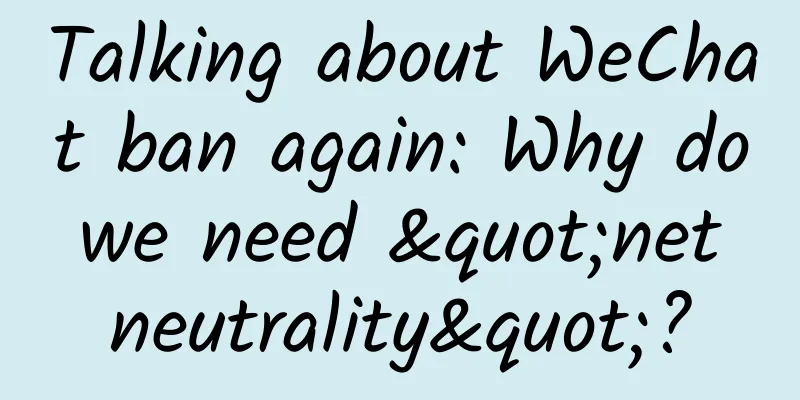Talking about WeChat ban again: Why do we need "net neutrality"?

|
Last week, I proposed the extended concept of "net neutrality" in my article " Network Neutrality System: The Antidote to the WeChat Ban Farce ". Some netizens believe that such a system is unfair to Tencent, because WeChat is a social software developed and launched by Tencent itself, not a public relations infrastructure such as telephones and computer networks, and Tencent's arbitrary behavior is understandable. In China, determined by our national conditions, public services are considered to refer specifically to social services provided by the government. Even in some areas, such as highways, private investment is allowed to join, and the narrow PPP model is still adopted, that is, financing and construction, and the actual construction process is still under the full control of the state. From this point of view, Tencent's WeChat is indeed not a public service in the traditional sense, and should not be subject to mandatory intervention and supervision. But the extended concept of "net neutrality" I proposed is not only aimed at the construction of laws and regulations, but more refers to the social obligations that large Internet companies should fulfill. Compared with mediating the infighting between giants, the concept of "net neutrality" focuses more on protecting the interests of ordinary start-ups. Alibaba, Tencent and even NetEase are all Internet companies of considerable size. Although the competition between them is fierce, it is often not fatal. However, for small and medium-sized Internet companies, especially start-ups, the small aftermath of the war between giants can make them disappear into thin air, and even their screams will not be heard by others. In China, the situation of start-ups is not very good. Although the country has issued a large number of documents to support young people to start their own businesses, the policy benefits cannot make up for the poor entrepreneurial environment. Plagiarism and malicious competition occur almost every day. The lag in the construction of laws and regulations allows large Internet companies to act recklessly and seize territory in various fields without considering the feelings of their peers. In order to survive in such a harsh environment, Chinese Internet startups often need to make full use of all the resources at hand. From free enterprise services to open platform network interfaces, startups do not give up any opportunity to grow themselves. However, the control of almost all these services and interfaces is in the hands of Internet giants. Even extremely small changes in the rules may accidentally hurt a large number of innocent companies. If the giants deliberately use their control to attack these potential competitors, the consequences will be even more disastrous. Tencent may not enjoy a dominant position in the field of instant messaging software, but for a software like WeChat, Tencent's dominant position is absolute. We must limit this absolute dominance to ensure that startups that rely on the WeChat ecosystem will not be uprooted in the face of competition from Tencent. The significance of "network neutrality" is to clarify the boundaries of the giants' actions and prevent them from abusing their dominant position. We allow platform owners to set certain access rules for open network interfaces, but we reject discriminatory restrictions. We hope to see an open ecosystem emerge, and we do not reject a completely closed ecosystem, but we resist the practice of closing in the name of openness, and the behavior of ruthlessly abandoning small and medium-sized enterprises after squeezing out all their value. This is intolerable. We should not be afraid of competition, and should even advocate full competition, but we cannot accept the outcome of being disqualified from the competition before the competition begins. We don’t want to hear such pessimistic statements as “It will be difficult for Chinese Internet giants to emerge after Alibaba’s listing”. We would rather believe that the Internet will bring unlimited opportunities and endless wealth to young people in China. But if China’s Internet giants are unwilling to make changes and continue to be obsessed with the “dimensionality reduction” war of killing one thousand enemies and losing eight hundred of their own, perhaps China’s Internet will become a stagnant pool of water, with a few huge information islands floating alone on it. Therefore, I suggest that China's Internet giants should sign a "Network Neutrality Convention" to actively limit their power in order to promote fair and full competition. As far as the current situation is concerned, it does not seem to be a wise move to actively limit their power, but from a long-term perspective, doing so can help China build a mature and healthy Internet ecology and effectively prevent vicious competition and meaningless mutual oppression. A relatively stable network ecology is also conducive to the innovation of giants and avoids duplication of construction just to attack opponents. Small and medium-sized enterprises can also fully compete on a relatively fair platform, rather than dying meaninglessly and quietly. There may really be a "big filter" or a "dark forest" in the universe, but at least in the Internet field where we have the ability to influence, we should try our best to avoid such a situation. History has proven more than once that unrestrained power in any field will inevitably lead to tragedy. As a winner of Toutiao's Qingyun Plan and Baijiahao's Bai+ Plan, the 2019 Baidu Digital Author of the Year, the Baijiahao's Most Popular Author in the Technology Field, the 2019 Sogou Technology and Culture Author, and the 2021 Baijiahao Quarterly Influential Creator, he has won many awards, including the 2013 Sohu Best Industry Media Person, the 2015 China New Media Entrepreneurship Competition Beijing Third Place, the 2015 Guangmang Experience Award, the 2015 China New Media Entrepreneurship Competition Finals Third Place, and the 2018 Baidu Dynamic Annual Powerful Celebrity. |
<<: Alibaba and SAIC: What handshake? What peace?
>>: How Weibo red envelopes replicated the magic of the Ice Bucket Challenge
Recommend
2021 CPA Money-Making Project Training Camp, where beginners can earn 200-1000 yuan per day
2021 Hand-in-hand teaching you how to play the CP...
Is it contradictory to protect a certain species with protecting biodiversity?
A few days ago (May 22) was the International Day...
They are both potato chips, so why don’t we have to pay for “air” when buying potato chips in a bucket?
Reviewer: Wang Guoyi Postdoctoral fellow in Nutri...
Seed users, how to achieve growth from 0 to 1?
I believe that many startup teams have encountere...
How much does Baidu AiPurchase charge? Is the effect guaranteed?
How much does Baidu AiPurchase charge? Is the eff...
Lizhi APP Product Analysis
This article aims to analyze the current status o...
my country's first 5G package has been announced, and there are a lot of 5G phones waiting for you to choose
This article is reproduced from Leiphone.com. If ...
Boss Dai from Fantong: "Yuanchuan Investment Academy"
Boss Dai from Fantong: "Yuanchuan Investment...
A fetus found to have "super male syndrome" needs to be aborted, otherwise it will become a criminal when it grows up?
“Are children with super male syndrome potential ...
50W bloggers "100 Kinds of Life" short video creation camp, everyone can make their own 1-minute short video Baidu cloud download
500,000 bloggers "100 Kinds of Life" sh...
Humans have been exploring the moon for more than half a century, so why is it still difficult for spacecraft to softly land on the moon?
On October 3, the Russian State Space Corporation...
How to name a brand? There are several common methods
The name should tell potential customers what the...
Analysis plan for information flow advertising channels!
As an information flow optimizer, the most diffic...
New Brand Marketing Model-Reflective Marketing Thinking
In marketing work, we often encounter the followi...
Is it expensive to join the Harbin flash sale mini program? Harbin Seckill Mini Program Franchise Fees and Process
What is the price to join the Harbin flash sale m...









